Back in June, I watched my Blind Spot selection, but due to a busy schedule, was unable to write about it at the time. A similarly busy docket led me to delay writing on my August selection. It was more than just an overloaded schedule, however, that prevented me from writing about the two pictures. Both films gave me a visceral, moving, and in some ways unspeakable experience that has resisted my efforts to begin formulating in words. The films in question were Robert Bresson’s Au hasard Balthasar in June, and in August the Wim Wenders picture Paris, Texas.
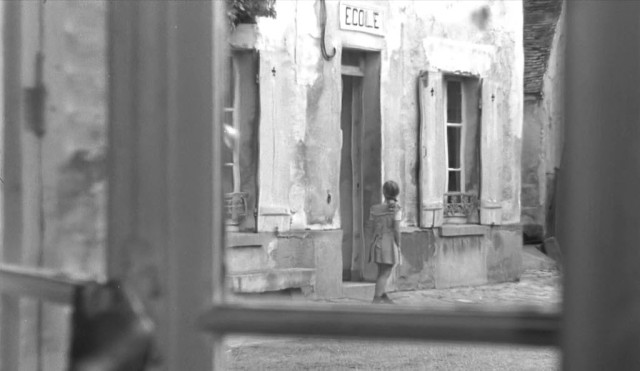
We first see Marie through this window, our view distorted by the imperfections in the glass.
Despite great differences in setting, visual style, language, and the context of their era, both films have at their center a vulnerable and abused young woman, whom we find in heartbreaking circumstances. Each film has an oblique way of approaching the emotional and physical traumas that the women undergo. In both cases the indirect presentation of their experience creates emotional echoes within both the world of the film and within the viewer. Rather than distancing us from these women, the emotional experience is intensified and made more acute by seeing them through the lens of other characters. In Bresson’s film, we follow a donkey and a town drunk through struggles that reflect the central character’s at an angle. In Wenders’s film, the young woman only appears in person in about the final hour of the film, so that we know her only through the conversations and reminiscences of other characters. In both films, such scenes discussing an absent third character give perspective and nuance to what we see of them, and inject an ambiguity which inspires compassion and restraint in our interpretation of the choices made by the young women. Both Bresson and Wenders seem to show a generosity to the women in their stories which inspires an empathetic response from the viewer.
In Au hasard Balthasar, Marie is a young woman who falls for the wrong boy. She has grown up, close as a brother, with the son of the landlord, but as she enters maturity, she is bored by him as a safe, wealthy, and straight-as-an-arrow suitor. Instead, she becomes lovers with a young hoodlum, Gerard, who repeatedly shows her indifference, domination, and even violence. Why does she do this? That is, to me, the central mystery of the film, and one which does not admit of a simple answer. It is enough for now to say that in my view, Bresson does not cast aspersions or focus on blame, but tells her story with compassion through what could be considered her own poor choice in companion.
No one’s choices are without context, and we are given much to consider. She is a young woman with seemingly few prospects, whose friends have moved away, and whose father, though caring, is also stubborn and prideful to the detriment of the family’s livelihood and reputation in the town. Subtly, too, we are brought to care for and empathize with Marie as the film progresses, in large part by the way that her character comes to be identified with the donkey, Balthasar as they experience parallel torments, sometimes from the same tormentors.
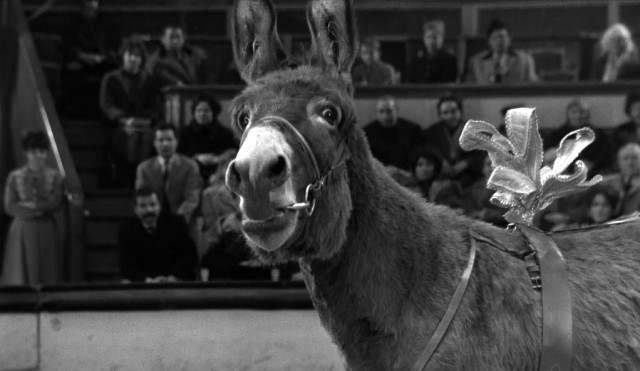
The title means, “Balthasar, at random” – the donkey finds his way into all kinds of cruel and absurd situations – like the circus.
Through the trials of both Marie and Balthasar, Bresson explores the depths of petty human cruelty. Balthasar is passed from owner to owner, often by a strange circumstance, but only during the episodes where he is cared for by Marie is he given affection and proper tending. The animal endures multiple forms of abuse, from beatings, to overwork, to having a paper tied to his tail and lit on fire. It has often been remarked that Balthasar is a Christ-like figure, a “suffering servant.” Indeed, he dies at the end of the film, literally carrying the burden of other’s sins, in the form of smuggled contraband. But critically, we are denied any sense of redemptive meaning in the sufferings either he or Marie endure. In Marie’s final humiliating ordeal, she is stripped, beaten, and locked alone in a room, crying as oglers stare at her from the window. After this, she runs away—disappearing from her home and from the film. We are left to wonder what will become of her—her mother’s words grimly assure her suitor that she will never return. Her father fades away and dies from some unspecified illness, but mostly from a broken spirit. After having suffered the loss of even his daughter, he can take no redemptive solace from the words of Scripture that a visiting priest reads him on his deathbed.
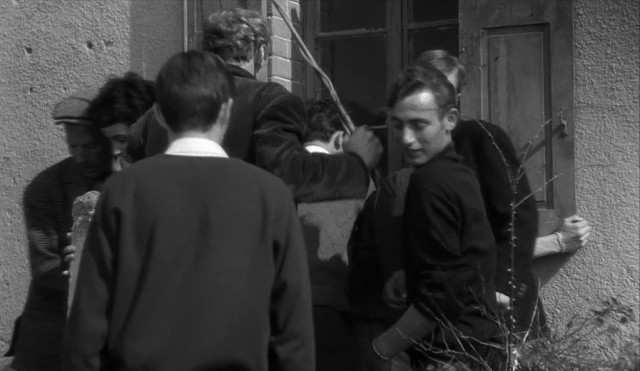
The father and suitor drive off the group who would stare at Marie in her miserable state.
To my recollection, there is no character that is ever shown smiling in the film. Hardly any voice is raised either. The non-professional actors deliver considerably low-key, almost monotone performances that are paradoxically powerful, all the more because they refuse to manipulate our emotions with histrionics. The cruelty of people to each other, of fate, and of the consequences of our own choices, are all brought to bear on the characters in the story. Consider, for example, that the town drunk, Arnold, receives an unexpected windfall of an inheritance, right at the moment when he is expecting to be arrested by the police. After a raucous celebration, he heads home, riding on Balthasar, only to fall from the donkey’s back and hit his head on the pavement, killing him. This sort of double reversal of fortune, in which a man is brought up from the gutter only to be cast down in a random and meaningless way, is emblematic of the way the film explores cruelty.
Though Bresson’s film is frequently cited for its Christian imagery and themes, (it begins with children acting out a baptism for the donkey), it’s not clear that Bresson is endorsing a Christian view of suffering. Paris, Texas, however, offers a more hopeful and redemptive arc. Wenders’s film begins with a spectacular aerial shot of a man shuffling in the Mexican desert. This is Travis, wandering mutely through the the wilderness in a self-imposed exile. His journey begins with him running away from the trouble and pain of his past, but transforms into a penitential, monastic-like pilgrimage. Balthasar several times likewise runs from his abusers, often into a worse situation. But though Balthasar is an innocent victim, we come to find out that Travis is really the architect of his own pain. Through jealousy, selfishness, and alcoholism, he came to hurt his lover and abandon her and their young child. She, in turn, left her son to be cared for and brought up by Travis’s brother and his wife.
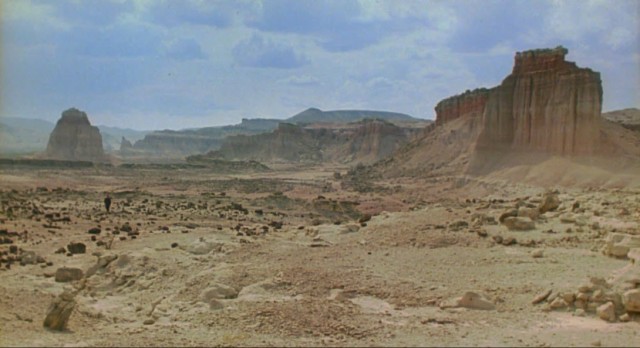
Travis, a speck in the wilderness, has been alone so long that he has forgotten what he was searching for.
Travis is rescued from his sojourn in the desert by his brother, and brought home to be reunited with his son, Hunter. Hunter gradually warms to Travis, and eventually chooses to join Travis on a trip to try to find Hunter’s mother, Jane. They know that Jane lives in Houston. When Travis finds Jane, he is heartbroken to find that she is working in a peep show club, where men view strippers through a one-way mirrors. The jealous suspicions which led to his former abuse and neglect of her seem confirmed. He leaves town and begins to return home (and to the bottle), when a pivotal exchange between him and Hunter occurs. Travis tells the story of his own father, who had often told people as a joke that Travis’s mother had been born in Paris—neglecting to mention that he meant Paris, Texas, not France. Travis says that his father told the lie so many times that he believed it himself, and it became a “sickness” that colored his view of his wife.”He looked at her; but he didn’t see her,” Travis tells Hunter—like looking at the mirror side of a one-way mirror, knowing someone is on the other side, but only seeing yourself.
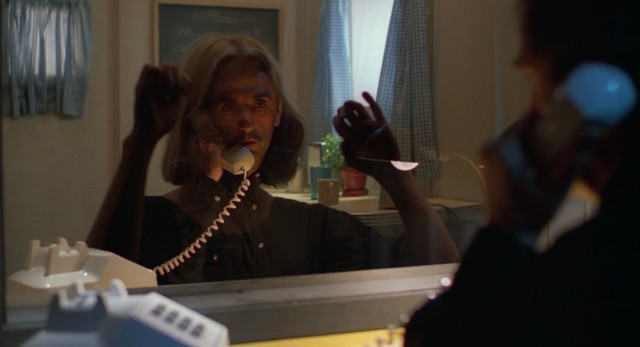
Who do you see when you look at another person?
Just like Travis’s father, characters in both films don’t see each other for who they really are. The cruel behavior of Marie’s lover Gerard is condoned and excused by both herself and Gerard’s guardian. Rumors are spread which cause good people to have their reputations destroyed. People play roles for others, like the workers in the peep show, and deceive themselves as well. Hunter lives with a couple he calls mom and dad, but are his “real” parents the ones who stayed to care for him, or the broken people who gave life to him?
In telling his story about his parents, Travis is finally able to relate his own treatment of Jane to the actions he saw as a sickness in his father. He can finally begin trying to make amends for his past sins and to bring about what reconciliation remains possible. He returns to see Jane at her work again, but this time, he does not condemn her, but rather confesses his own role in the breakup of their relationships. He knows he cannot heal their rift, but that he can bring Hunter back to his mother. He starts to see who she is, and not who he wanted her to be. Possibly this is the critical element that the characters in Bresson’s tragic story failed to achieve in their relationships.
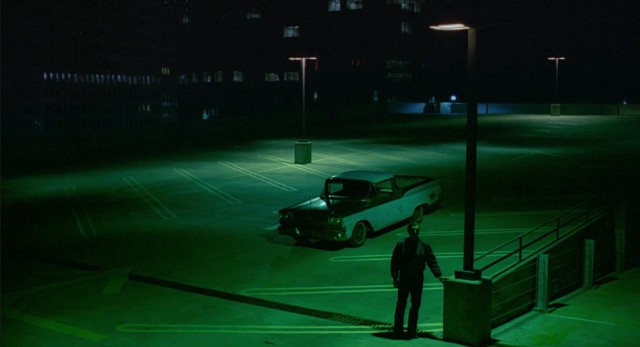
The end of a pilgrimage, but the beginning of a new life perhaps. Lonely, and sad, but with more wisdom about himself and another.
The final scenes of Paris, Texas, are so achingly beautiful because the emotional tone is so perfectly matched with some of the most incredible color cinematography in film history, by Robby Müller. While the finale of Au hasard Balthasar leaves us with the uncertain conclusion that chance may rule our fortunes, often with the result of great suffering. But Paris, Texas offers a measure of redemption in the reunion between Hunter and his mother. Travis’s departure reminds us that we have a choice to make sense of our suffering, even suffering that is a result of our own decisions. It’s not too late to turn around on the road and try to find what peace we can, for the sake of others.
This post is part of the Blind Spot Series, hosted by The Matinee blog.




I’ve read rave reviews about Paris, Texas and hope to see it soon. Au hasard Balthasar, however, is one I’ve never even heard of, and it sounds haunting and unforgettable. Both of these films sound like they make a real impact on the viewer.
As always, I enjoyed your insightful review.
LikeLike
Both are heartbreaking films, and both are essential masterpieces. If you have access to FilmStruck, they are also both streaming there. Thanks for reading and for your kind words, and for sharing!
LikeLiked by 1 person
Interesting pairing. Although I’ve eventually come around on Bresson in general, I still find myself unable to “get” Balthazar. I am always simply brought down by its casual cruelty. Probably a failing on my part.
On the other hand, I think P,T is a masterpiece. As a portrait of a man who feels compelled to make penance, it’s unparalleled. The fact that the quest might be somewhat misguided makes it extra poignant. It’s to the firms credit that it’s final passengers leave one so conflicted. In a lot of ways, it reminds me of Lars Von Triers’ Breaking The Waves.
LikeLiked by 1 person
I’m not sure you can “get” it. I think it’s asking questions about whether suffering has meaning, or is totally arbitrary. Additionally, it dramatizes the mystery of how much our suffering is due to our own choices, how much to the choices of others, and how much to mere chance.
These are questions that we must continue to struggle with as humans. Does the presence of God’s grace, made evident in the mock baptism received by Balthasar, and in the scene of Gerard (!) angelically singing at Mass, overcome or transform this experience of cruelty in our lives? This seems an open question as well in the film, but one that is worth exploring, and which is made acute by the sadness and empathy that the film evokes.
LikeLike